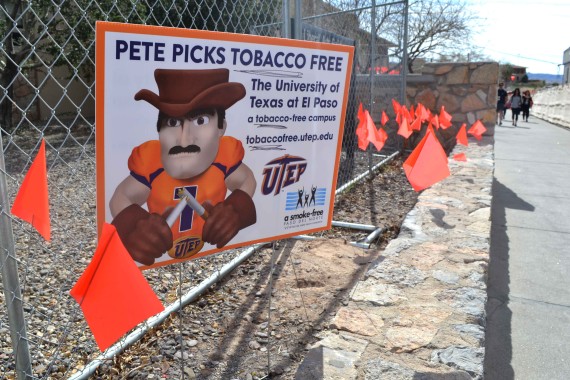Maintaining a tobacco-free campus may prove difficult to enforce as some students are choosing not to follow the “self-governing” method officials have proclaimed.
UTEP’s Environmental Health and Safety Department enacted the tobacco ban on Feb. 20.
The change in policy has been published under the UTEP Handbook of Operating Procedures under Environmental Health and Safety. The handbook contains the university’s official policies and procedures.
Despite stating a clear change in policy under the handbook, “the use of tobacco products is prohibited at all times on University Property,” the enforcement of the policy is not as clear.
The ban places responsibility of enforcement upon the UTEP community. The official press release for the ban stated, “much can be accomplished through respectful and polite reminders to members and guests of the University that we are a tobacco-free campus.”
Senior psychology major Mike Rodriguez feels the enforcement policy is weak.
“I don’t think this is my responsibility to tell people to stop smoking on campus,” he said. “Who am I to tell them not to do it? We are all adults here. You should be able to regulate your own behaviors.”
According to Robert Moss, assistant vice president of the Environmental Health and Safety Department, the enforcement of the policy relies on an “honors system” and on the community to report offenders.
“We’re not going to have police officers running around giving tickets,” he said.
This doesn’t mean stricter forms of enforcement could not be applied after repeated offenses.
“Initially people will be encouraged to comply, we hope that it won’t be too cumbersome,” Moss said. “If there are repeated offenses, that student could end up before the student dean.”
Under HOOPS, disciplinary actions for UTEP staff employees could include demotion, suspension without pay or dismissal.
However, according to Roger Brown, assistant vice president of Human Resources, the department in charge of disciplinary action for staff employees, the self-governance will also apply to them.
If a staff member were to continue smoking on campus despite polite reminders, the employee could be reported and “human resources would have a conversation with that person,” Brown said.
Further violations by the employee could also lead to a referral to the President’s Office.
The staff member would have the option to appeal disciplinary action against them under the Challenge as the Fairness clause in HOOP.
Vice President of Student Affairs Gary Edens is one of the ones contacted along with Human Resources if someone were disrespecting the ban.
“This policy is in place at numerous universities and colleges across the United States. A staff member always has the right to voice any policy concerns to their supervisor or to Human Resources,” Edens said.
According to Brown, the success of such an appeal would be dim.
“I don’t see how you could challenge the fairness of it if it applies to everybody… Because it’s a university-wide policy I don’t see how successful (an appeal) would get.”
Kerri Harrison, a communication lecturer and smoker, believes the ban is ineffective.
“I think that people are going to find a way to smoke,” she said. She added that she believes it is also an infringement on individual rights.
“When we start making decisions for peoples’ personal choices—deciding what is good and bad for you just because you don’t like it—I think it opens up a very dangerous door,” she said.
Senior psychology major Mara Rivas said although she is an avid smoker, she feels that this ban could be beneficial for smokers and nonsmokers alike.
“I think it’s good because I smoke only here on campus so this ban could probably help me stop smoking,” she said. “But I will not tell people to stop smoking.”
Maria Esquinca and Amanda Guillen may be reached at [email protected].










Jen • Feb 26, 2014 at 2:36 PM
I can understand how tobacco smoke can be harmful to others, but what is the legitimate reason for banning E-cigarettes? That’s like banning nicotine patches.